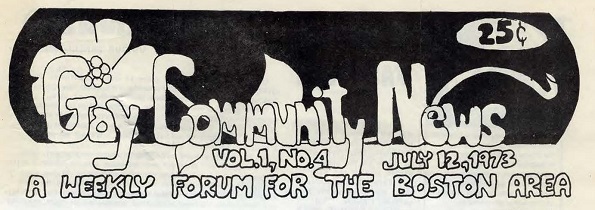Gay Community News at 50: Content, Controversy & Coverage

MHS Event
Co-sponsored by The History Project
Chris Bull
Gayle Rubin
Chris Guilfoy
Craig Bailey
Moderated by Amy Hoffman
This is a hybrid event. FREE. The in-person reception starts at 5:30 and the program will begin at 6:00.
The in-person program has sold out. Please register to join us online.
Throughout its run, Gay Community News' staff, volunteers, and readership all debated how to answer the question, "What is gay news?" This panel will explore the intersections and divergences of opinions about what issues GCN covered, from feminist politics to international affairs.
Hybrid Event
The in-person reception starts at 5:30 and the program will begin at 6:00.
Masks are optional for this event.
The virtual program begins at 6:00 PM and will be hosted on the video conference platform, Zoom. Registrants will receive a confirmation message with attendance information.
